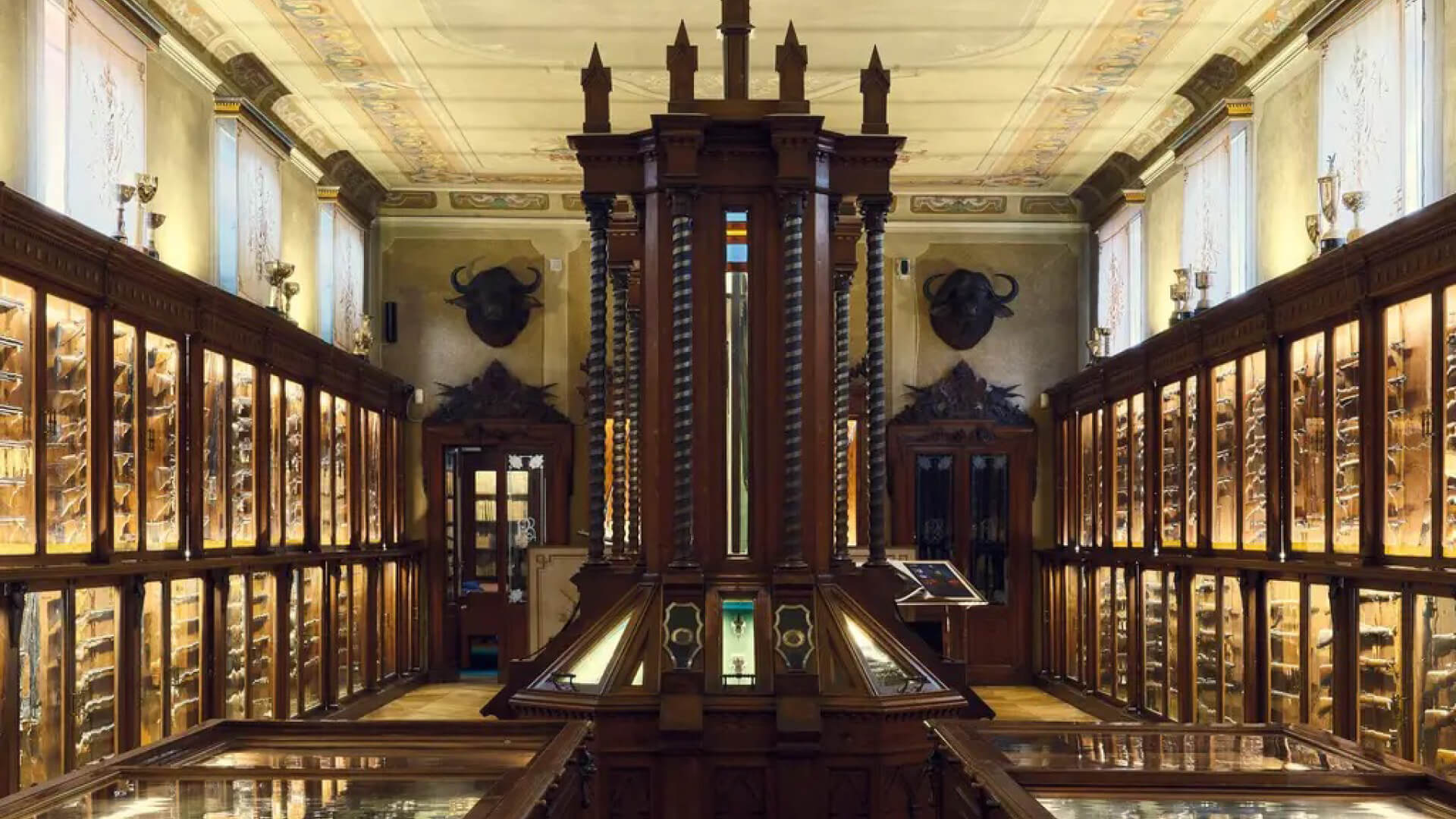
22 May The oldest company in the world: How does a company survive 500 years?
When Beretta was founded in the 16th century, there were no nation states, witches were burned and tomatoes were considered poisonous. 15 generations later, the Italian weapons manufacturer is still in business.
Music sounds in the engraving workshops, a strange kind of music. A bright, metallic sound fills the room. With small hammers and chisels, the craftsmen decorate the side plates of the rifle stocks with artistic hunting scenes. One employee has a large photograph in front of her eyes. It shows a hunting dog with a duck in its mouth, a classic motif. A customer wants the image on his rifle – engraved in zinc. The young woman checks her work with a magnifying glass.
Time seems to stand still in the workshop; the atmosphere is reminiscent of an artist’s studio. Or a watch manufacturer in the Swiss Jura. “Graduates from art colleges work here,” says a retired employee who shows me around the company.
Art and weapons? An unusual combination. But Beretta is also an unusual company.
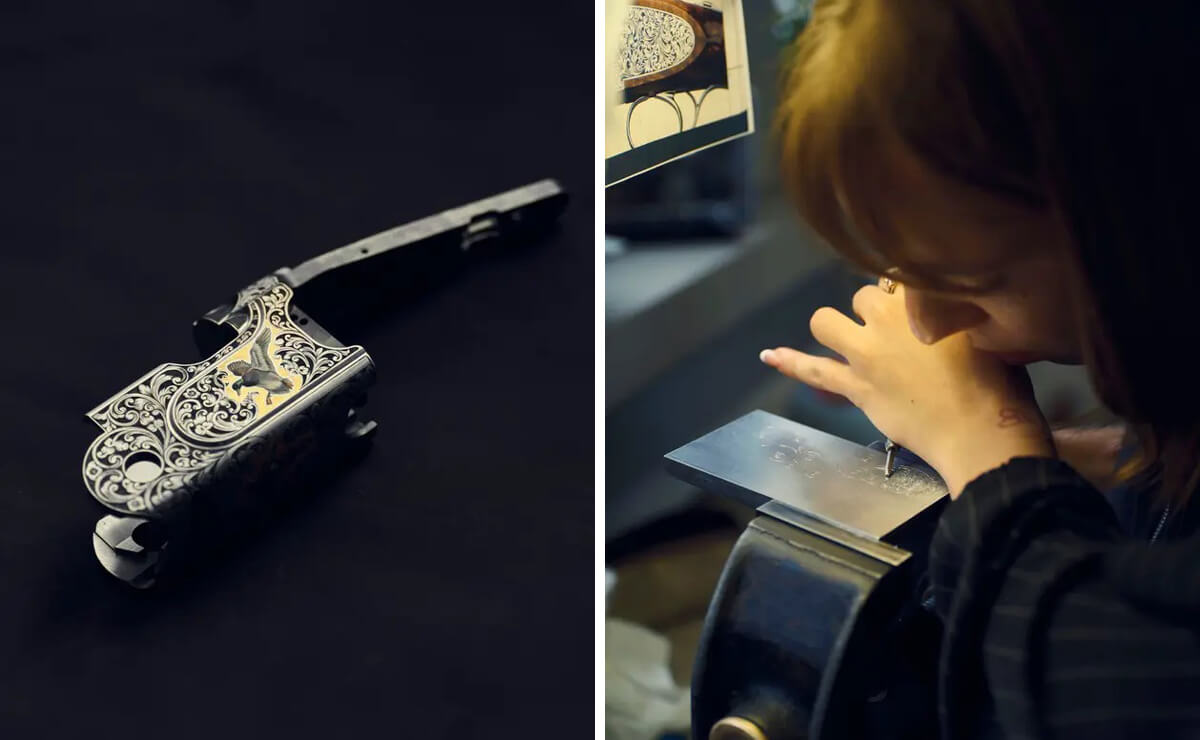
In the engraving workshops, employees decorate the side plates of the rifle stocks with artistic hunting scenes.
The age-old business model
Beretta is the oldest manufacturing company in the world. It has been manufacturing weapons near Brescia in northern Italy for 15 generations. The Berettas have guided the family business through history for five hundred years. Through good times that made them rich. And through bad times that almost forced them to give up. How has the company survived half a millennium? Was it because the family is particularly forward-looking in its planning? Because there have always been wars? Or was it just luck?
James Bond and his Beretta
On October 3, 1526, the weapon maker Bartolomeo Beretta received 296 ducats for 185 cannon barrels that he delivered to Venice. The transaction is recorded on a small piece of paper that is kept in the State Archives in Venice. This document establishes the history of Beretta.
Bartolomeo Beretta came from the northern Italian town of Gardone in Val Trompia. Here the conditions for weapons production were ideal: a powerful river flows through the valley and there are large quantities of iron ore. The first craft businesses soon emerged, and the valley was given the nickname “Valle di ferro”, iron valley – just as the Santa Clara Valley in California eventually became Silicon Valley.
Today you could also call it Beretta Valley. Beretta is everywhere. The lettering with the family name is emblazoned not only on the huge factory halls, but also on schools and institutes, signposts and posters. Over 900 employees work at Beretta in Gardone, the area is inextricably linked to the company. The guide who shows me the company has worked here for over forty years; his father was also under contract with Beretta. He knows everyone in the company, “ciao,” he says to his colleagues as he leads them through the rooms, and “come stai,” how are you? It’s a family atmosphere here, despite the size.
The path leads to Villa Beretta, the company’s headquarters and representative office. The building was built in 1925 in an eclectic style. A bit of Gothic here, a bit of Renaissance there, as if it were a distant relative of the Landesmuseum in Zurich.
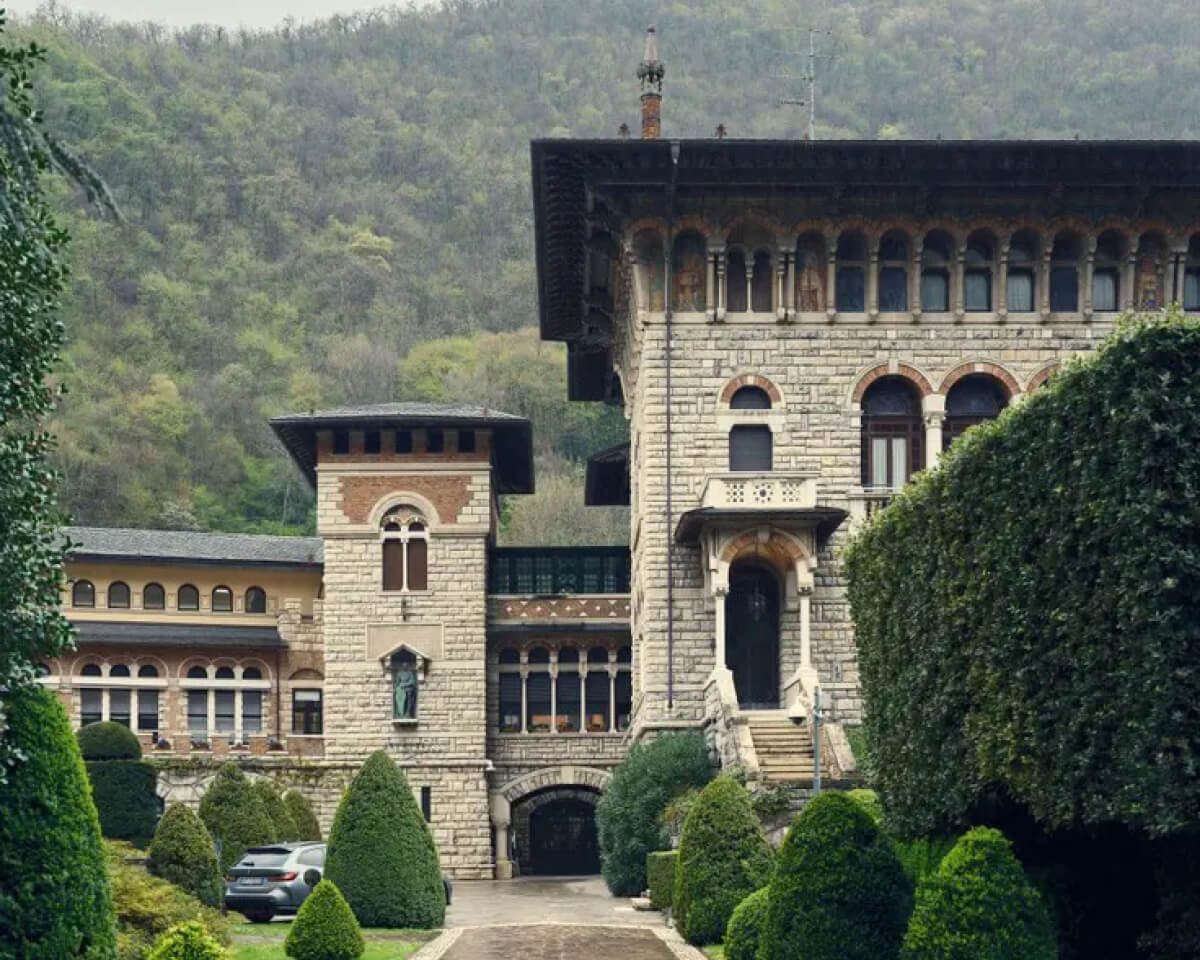
The striking Villa Beretta in Gardone Val Trompia near Brescia. Commissioned in 1925 by the then patron Pietro Beretta, the headquarters and representative office of the global company is still located here today.
Pietro Beretta, the company’s boss at the time, had commissioned the building – not only because he was a fan of great architecture, but to protect his employees from the threat of unemployment. It was the time after the First World War. After years of violence and destruction, the world breathed a sigh of relief, but the factory in Gardone ran out of work because the arms trade was slacking. This has happened again and again in history: when the world was doing well, Beretta suffered. And when the world suffered, Beretta did well.
Doctor Pietro, the boss
I pass the security check and go up the stairs to the first floor, past stuffed animals. Then I cross the weapons room, where the company’s products are displayed in showcases, including the 418 small pistol, which Ian Fleming mentioned in his first James Bond novel in 1953, as a kind of literary product placement. In the next room, documents about the company’s history and a family tree hang on the wall.
This is where the most important man in the company sits, whom everyone respectfully calls “Dottor Pietro”: Pietro Gussalli Beretta, 62 years old.
Together with his brother Franco, who is two years younger, he represents the 15th generation of the family dynasty. Pietro is president and CEO of the Beretta holding company based in Luxembourg, Franco is the vice president and CEO of the arms factory in Gardone. The business magazine “Forbes” recently estimated the Berettas’ assets at $2.4 billion.
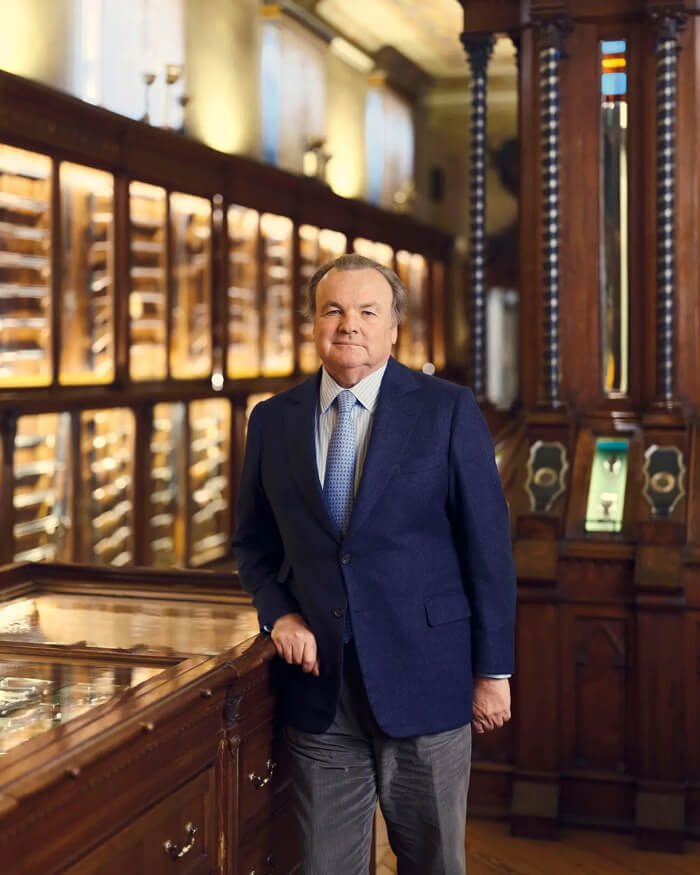
Together with his brother Franco, he represents the 15th generation of the family dynasty: Pietro Gussalli Beretta, 62 years old, President and CEO of the Beretta Holding.
The 16th generation is already ready: Franco’s son Carlo, 27, and Pietro’s daughter Maria Teresa, 12, could one day continue their fathers’ legacy.
Is there a secret to how a family-run industrial company can survive for so long? “You see,” answers Doctor Pietro, “in the family we always say to ourselves: We may be old, but we can’t stay old. We always have to be innovative.” At some point the workers no longer made cannons, but rifles; later, mass production revolutionized the business, then the company opened up new markets throughout Europe. All of this costs a lot of money, says Pietro Gussalli Beretta. “But we agree on these central questions, that’s how we were brought up. We believe that our factories must meet modern requirements.”
You can see this for yourself on the company premises. The engraving workshops work for enthusiasts, for hunters and collectors who are prepared to spend tens to hundreds of thousands of euros. But the machines are humming in the halls next door. Robots pick weapon components and put them together. Employees check the production processes on the screen – hammers and chisels have no place here.
Experiments with cars
The Berettas were always tinkerers. Over the course of history, the family has tried everything possible – and rejected them again. Vintage cars in the company museum are reminiscent of experiments in the auto industry. Under the name BBC (the abbreviation stands for Beretta and the business partners Benelli and Castelbarco) they wanted to create an alternative to the Fiat Topolino. Or people tried to build calculating machines.
Because weapons production did not always run as planned, the company constantly needed new ideas, and the conditions were good. After the Second World War, during the years of the economic miracle, Italian design and know-how were in demand.
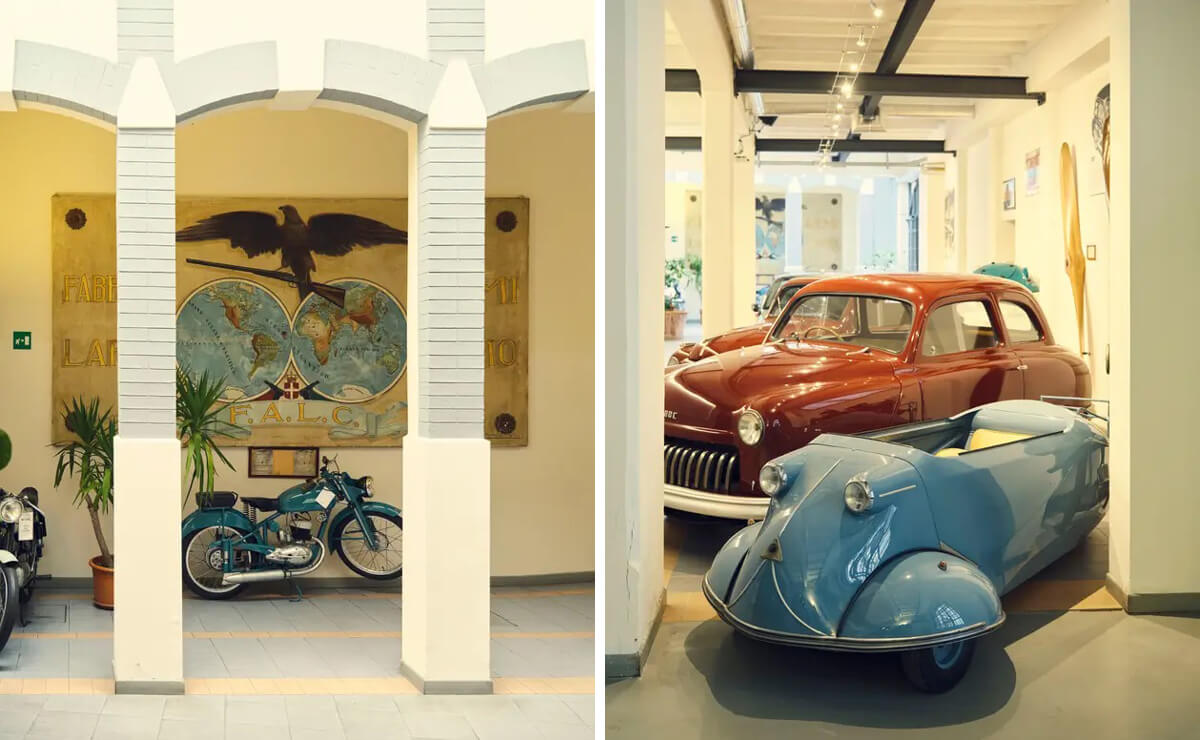
Exhibits in the company museum show how the Berettas continually tinkered with new products. However, attempts in the automotive sector, for example, proved to be of little use.
Nevertheless, Beretta stuck to its core business of manufacturing firearms and related products, which today include ammunition, optical equipment and outdoor clothing. The “defense” area, supplying armies, accounts for around ten to fifteen percent of the group’s activities. Equipping police corps and other law enforcement officers with firearms is much more important, says Pietro Gussalli Beretta.
The holding includes almost twenty well-known brands, in addition to Beretta “Holland & Holland”, a traditional British manufacturer of luxurious hunting weapons, the German “Steiner-Optik”, a specialist in binoculars and target optics, and the Thun-based “Swiss P Defense”, the former Ruag Ammotec ammunition factory, which the Beretta holding company bought two years ago. The holding company employs 6,500 people at over thirty locations worldwide. In 2022, the company recorded net sales of over 1.4 billion euros and an operating result of 286.5 million euros.
The Conquest of America
In five hundred years, the weapons factory in Val Trompia has become a global industrial group. The company has grown significantly, especially in recent years. “When I look at the history of our company, my brother and I represent the phase of globalization,” says Pietro Gussalli Beretta. «But none of this is thanks to me. The foundations for today’s group were laid by those who came before us.” His father Ugo in particular achieved something very special: he conquered America.
In 1985, Beretta achieved its breakthrough in the most important armaments market: the American armed forces introduced the Beretta 92 FS pistol as their official service weapon. How did Beretta manage to outdo the competition? The answer sounds simple: the quality was simply better.
But that is not the only explanation. Ugo Beretta was obviously a persistent man. Since 1978, special units of the US Marines, especially the anti-terror group “Seal Team Six”, have had the Beretta 92. At the time, it was the best nine-millimeter pistol in the world, said the Pentagon official responsible for it was responsible for procurement. Nevertheless, Beretta was advised of improvements. Ugo Beretta listened to the suggestions and adapted the weapon to his wishes. When the US Army put the contract out to tender, Beretta was ready: the Italian company won the contract, and the American arms industry was shocked.
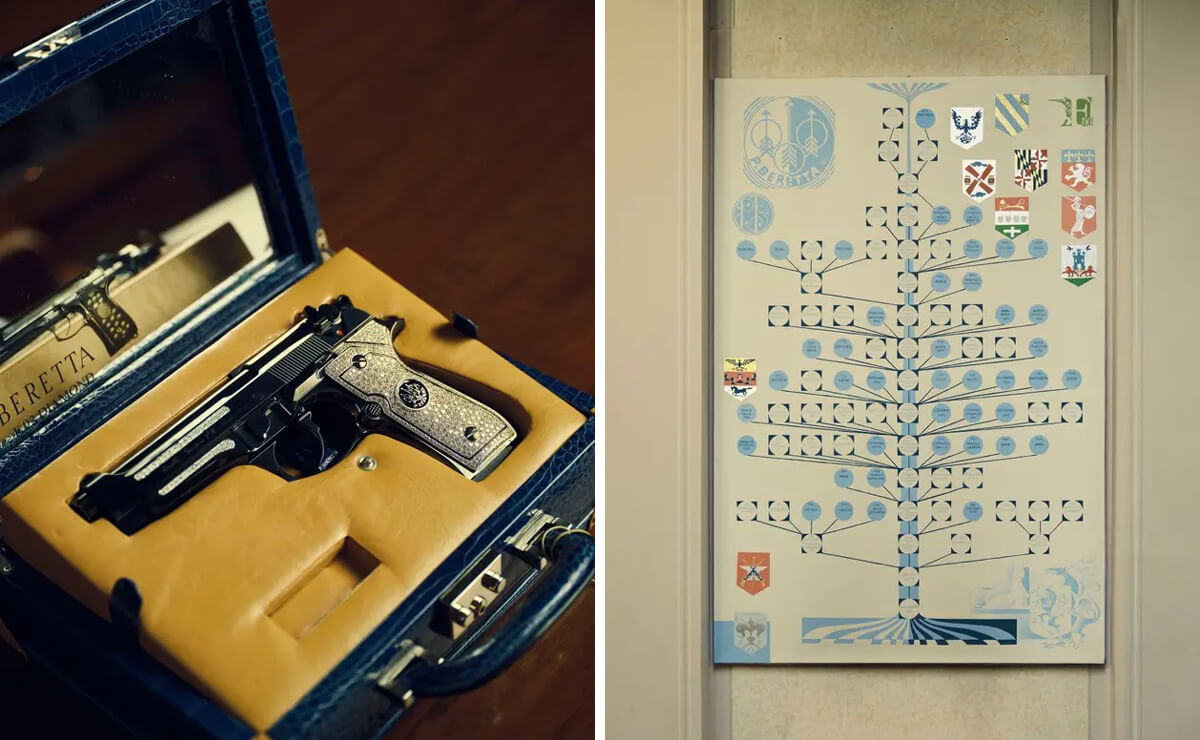
A luxury edition of the Beretta 92 FS decorated with diamonds (pictured left). In the meeting room, a family tree makes it easier to get an overview of the extensive family dynasty.
Reluctance to pay dividends
Italy is a country of family entrepreneurs. The area around Brescia and other regions in Lombardy and Veneto are home to countless small and medium-sized companies, specialized companies that produce components for machines or pharmaceutical products.
Here you will find a company landscape that is reminiscent of the Swiss plateau: modern industrial facilities, warehouses, logistics centers, highly competitive, well developed. These companies contribute to Italy being the second most important manufacturing country in Europe. Only in Germany are more goods produced. The export of Italian goods is reaching peak levels and the country can look forward to many years of trade surpluses.
But only a few Italian family companies make it into the circle of the big players on the world markets. This includes the Nutella empire of the Ferreros from Turin, individual companies from the luxury goods and food industries – and the Berettas with their weapons.
“Our decisions are all geared towards development and consolidation in the medium term,” says Gussalli Beretta. This distinguishes his company from listed companies. As a family business, the Berettas do not have to think short-term like other companies. In addition, he and his brother could make decisions quickly – without having to take the interests of external shareholders into account.
The company boss sees another advantage: “As a family, we can invest in the products of the future by restricting ourselves when it comes to dividends. It’s more important to us to be up to date and spend a lot on research and development than to collect a little extra dividend.”
This long-term thinking secures the Berettas a place in a special club.
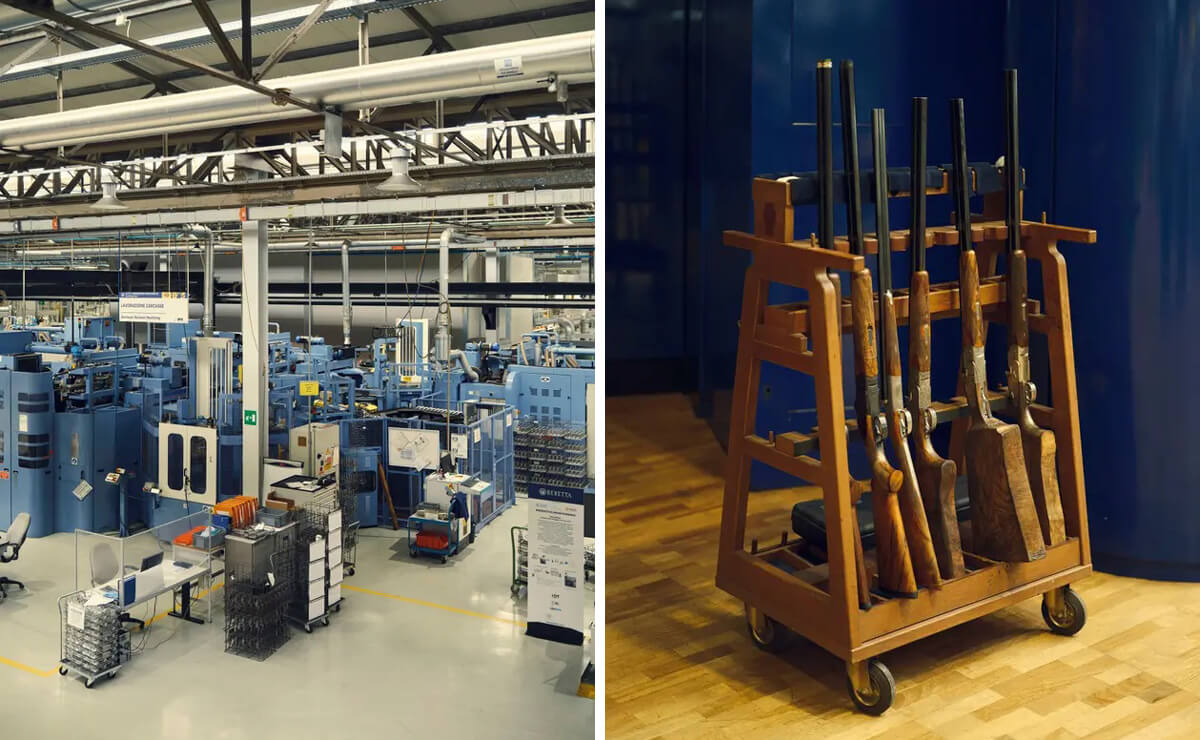
State-of-the-art technology in the production halls in Gardone, where rifles and pistols are manufactured for armed forces and law enforcement. And on the right is a view into another world: hunting rifles awaiting the final touches by specialized craftsmen.
The exclusive association
Pietro Gussalli Beretta is a member of a global association of family businesses. It is called “Association Les Hénokiens” and was founded in France in 1981 and has 55 members. One of the founders was Ugo Gussalli Beretta, Pietro’s father.
Only those who can look back on more than two hundred years of uninterrupted history are admitted into the illustrious circle.
What the members have in common is that, as descendants of the company founder, they run their companies or sit on the board of directors; They own at least fifty percent of the shares and are prepared to pay a membership fee proportional to their turnover. The majority of the “Hénokiens” come from France and Italy, but there are also many family businesses from Japan. Switzerland is represented by Geneva private banks.
Pietro Gussalli Beretta values the exchange in this committee. “No matter where you come from and what your cultural background is, there is a similar way of approaching problems in this group. It consists of thinking in long periods of time.”
Then the Beretta company will remain in family ownership for another five hundred years?
Doctor Pietro laughs. «Five hundred years? Of course I’m confident, but let’s talk about five years. I think it’s difficult to make predictions beyond five years given all the global uncertainties.” For the representative of a family that has managed to survive for centuries, this is a surprising statement. But a long history doesn’t have to mean anything for the future. Beretta has been on the verge of collapse several times.
The Nazis destroy the company
In a long book about the company’s history it says: Zio Giuseppe, a great uncle of Dottor Pietro, had serious doubts about the continued existence of the company. He considered his, the 13th generation, to be the last that would still produce firearms in Gardone.
Especially after the Second World War, the Berettas didn’t know what to do next. Northern Italy was a controversial theater of war, and Val Trompia did not remain unaffected. Beretta weapons were in use by all warring parties. Mussolini’s troops used them, as did the partisans. The Nazis occupied the company, gutted it and later completely destroyed it. “Our family lost everything in the war,” says Gussalli Beretta, “everything had to be rebuilt from scratch.”
This experience shaped the family. Although Beretta produces armaments and the company’s history is linked to war and violence, Pietro Gussalli Beretta says: “I don’t look at wars with the eyes of an entrepreneur. Rather, they fill me with concern. But wars happen, in our present and certainly in the future.”
Credits
Text: NZZ and Luzi Bernet
Pictures: Andrea Pugliotto
Source: NZZ – Die älteste Firma der Welt: Wie überlebt ein Unternehmen 500 Jahre?


